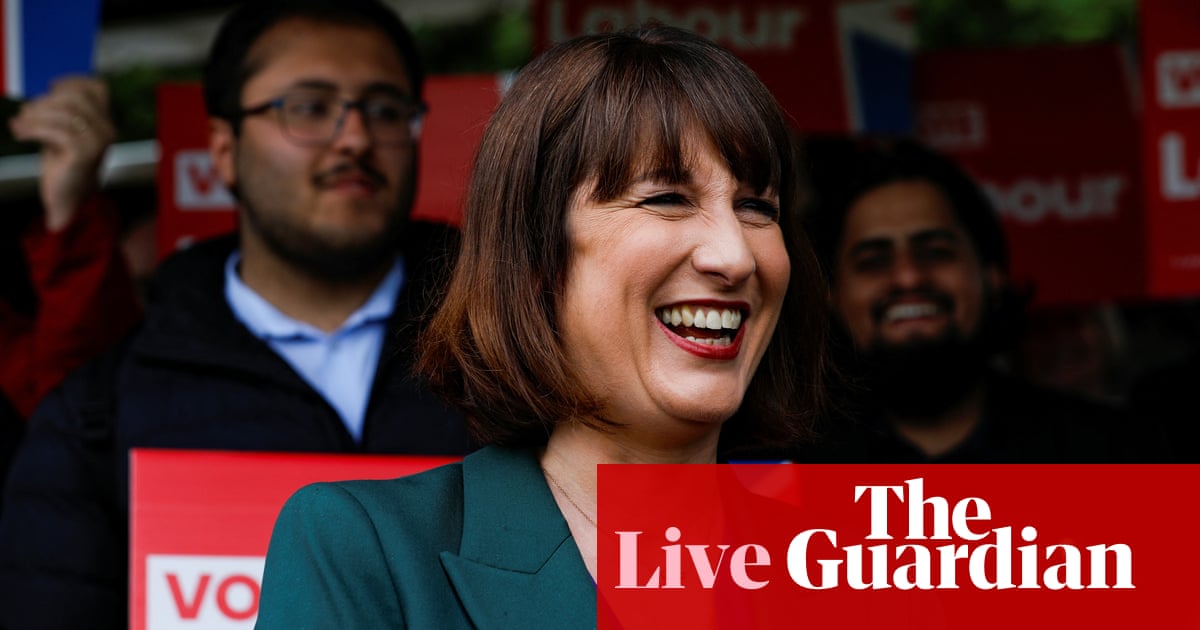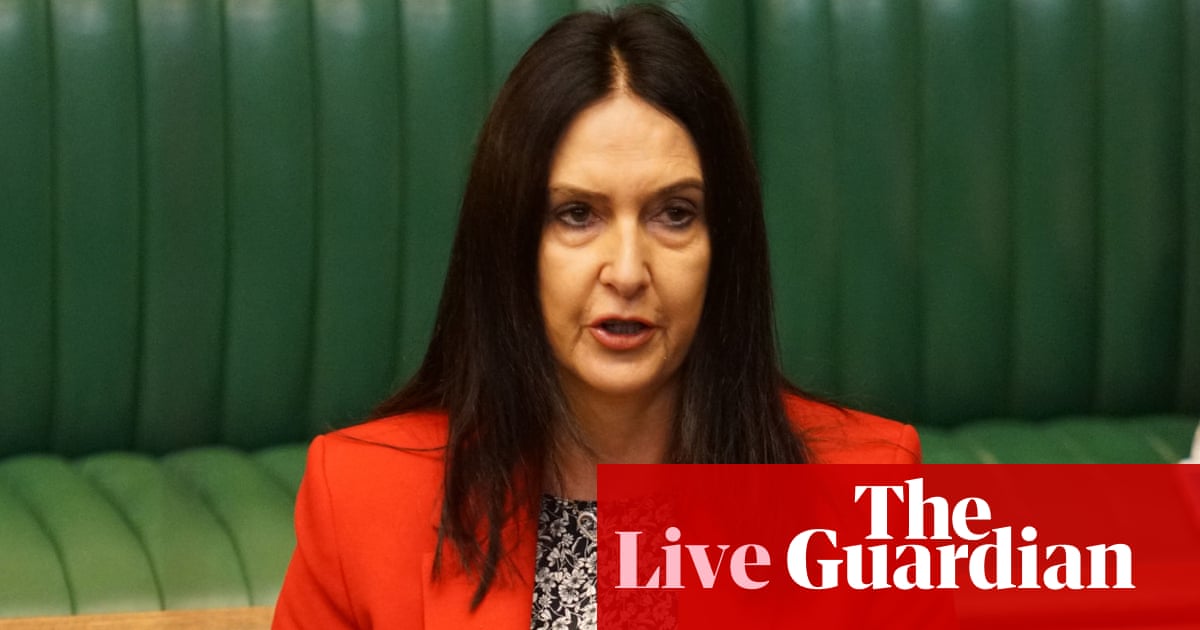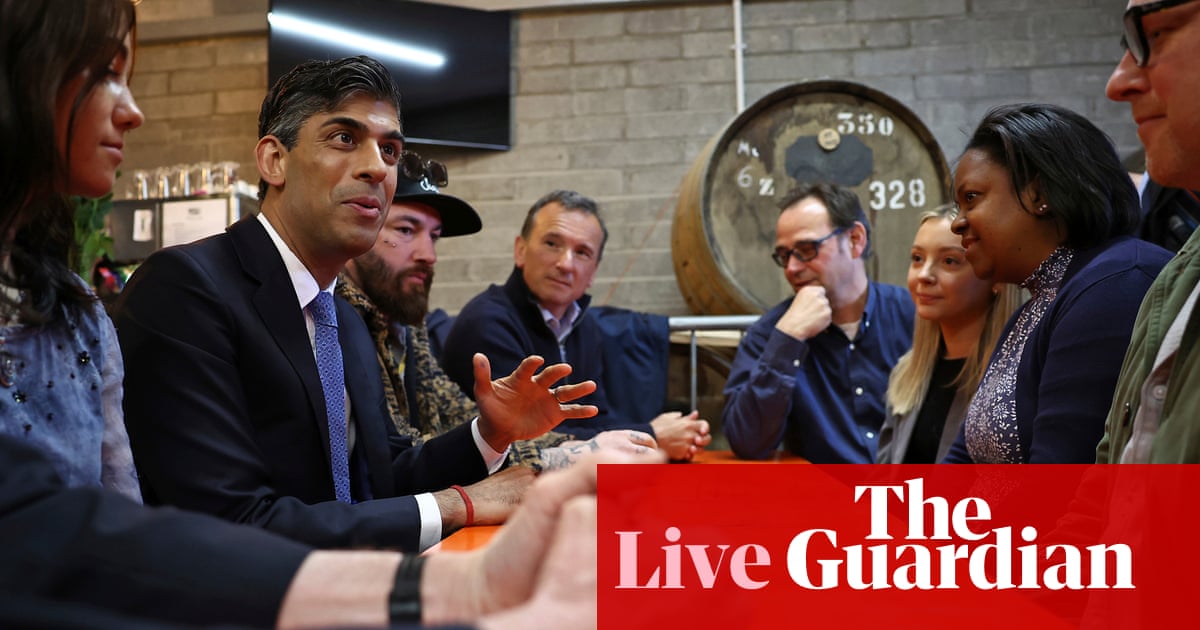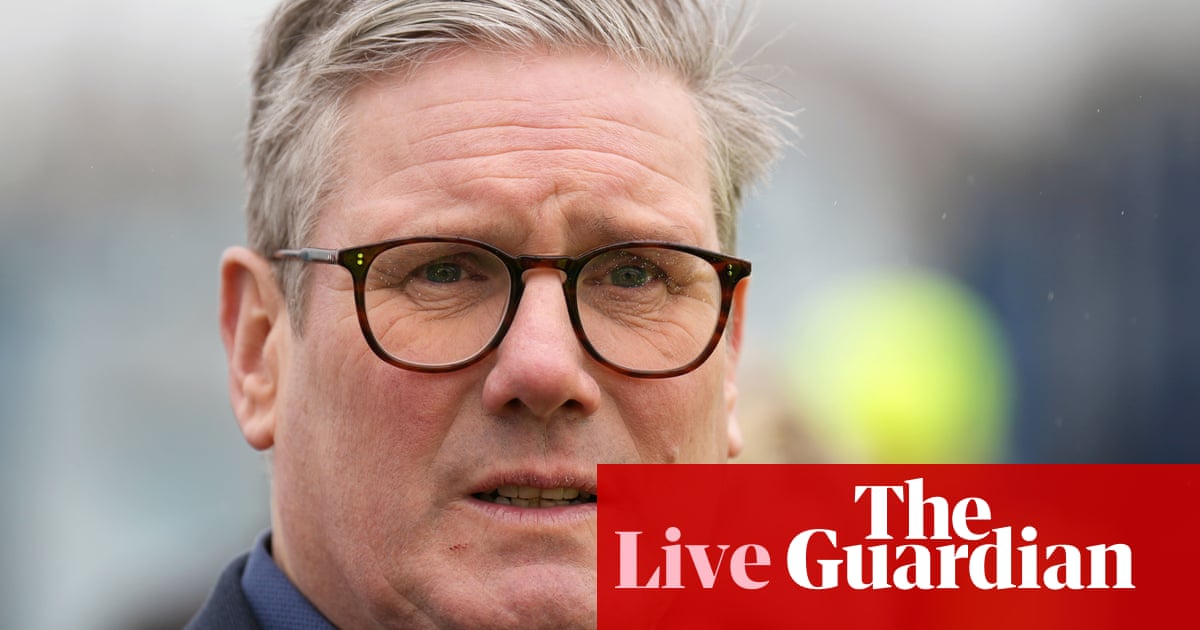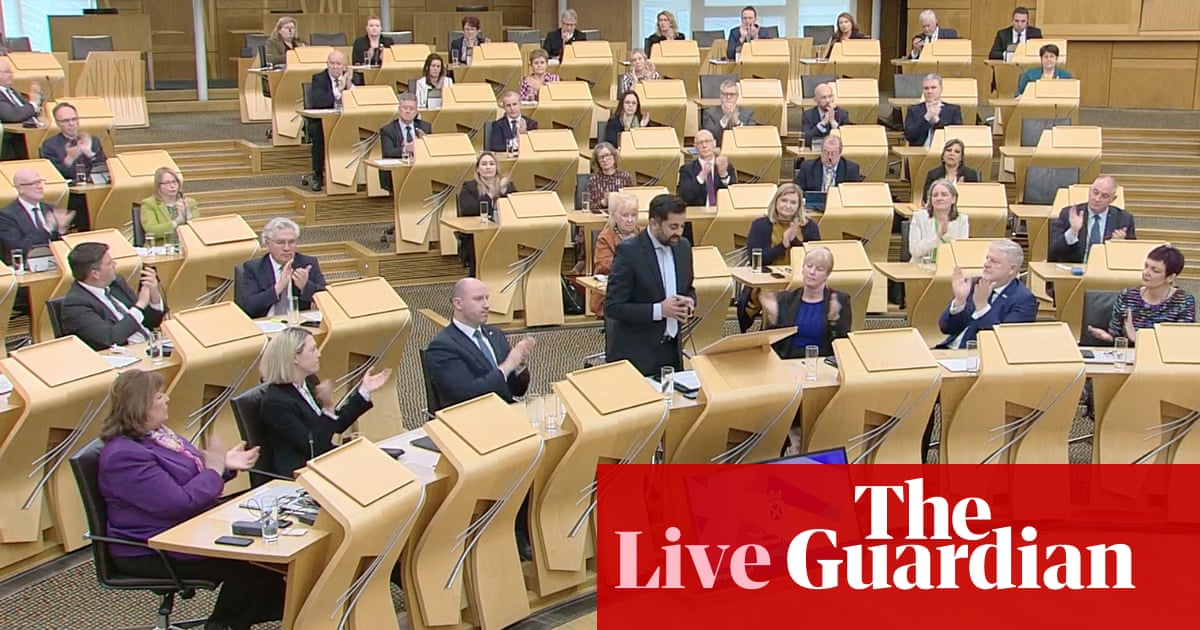
Scotland"s SNP government wins no confidence vote called by Labour
The Scottish government has won the vote by 70 votes to 58. There were no abstentions.
Afternoon summary
The SNP government has won a no confidence vote at Holyrood, but without MSPs coming any closer to knowing who will replace Humza Yousaf, who said on Monday he was resigning as party leader. John Swinney and Kate Forbes, the two leading candidates, are both still deciding what to do. According to a report in the Times, Swinney and Forbes met to discuss the leadership yesterday. In their story John Boothman and Kieran Andrews say:
A number of senior SNP politicians have publicly endorsed Swinney while support for Forbes has been more muted. However, Forbes, who narrowly lost last year’s leadership election to Yousaf after Nicola Sturgeon resigned, has refused to back down and said on Tuesday that she was seriously considering her options.
One of her supporters confirmed that Swinney and Forbes had met. However, when it was suggested that Swinney supporters would prefer an uncontested transfer of power, the source said: “They are not going to get it. Everything they do makes Kate look stronger.”
Several figures in the Swinney camp believe that he would have to offer Forbes a significant post to secure a deal to become SNP leader or to win a leadership battle. “He would need to say, ‘I would have Kate in cabinet’,” said one friend of Swinney.
According to a poll by Ipsos Scotland, Forbes has a five-point lead over Swinney amongst all voters on who would make the best first minister. But Swinney has a 10-point lead on this measure amongst people who voted SNP in 2021.
UK ministers have acknowledged for the first time that they are detaining asylum seekers to be removed to Rwanda, sparking demonstrations outside Home Office buildings.
Andy Street and Ben Houchen, who are standing for re-election as Conservative mayors of West Midlands and Tees Valley respectively, have both turned to Boris Johnson to support their campaigns.
Susan Hall, the Tory candidate for London mayor, has joined a Facebook group which contains Islamophobic hate speech and abusive comments about her opponent Sadiq Khan, the day after an exposé about its contents.
Kemi Badenoch has claimed that girls at a school who did not have access to single-sex toilets developed urinary tract infections (UTI) because they did not want to use gender-neutral toilets.
Ministers in the UK have agreed to a three-month deadline to establish a compensation scheme for victims of the infected blood scandal but warned it could be “unavoidably” delayed if parliament was not sitting.
Women are understood to be among those detained by Home Office enforcement officers in a series of raids this week after being picked to be sent to Rwanda, PA Media reports. PA says:
Department officials refused to say how many people had been held so far, arguing that ongoing operations prevented them from doing so. They confirmed more than two people had been detained, with both men and women in custody.
Pictures of some of the operations, released by the Home Office, indicate at least two of those detained so far are men and both appeared to have been taken into custody while they were in houses.
Enforcement action is said to have taken place throughout the UK – in England, Wales and Scotland as well as Northern Ireland – since midday on Monday.
Children are not expected to be detained as part of the operations.
Home Office officials strongly suspect legal challenges will be made in light of the detentions ahead of Rwanda flights but are confident they will be able to defend any such action thanks to the laws and policies in place.
It is understood officials also fully expect applications for immigration bail to follow but stressed that anyone released from detention will be subject to strict bail conditions.
Migrants can only be detained if there is a realistic prospect of their removal from the UK. This means they could be released on bail in future if no action is being taken to deport them.
The Home Office may have to refer migrants for a bail hearing if they have been detained for four months or more.
How MSPs voted in no confidence debate
The Scottish parliament has released the division list for the no confidence vote. All 63 SNP MSPs and all seven Green MSPs voted for the government, and against the motion.
And all 31 Tory MSPs, all 22 Labour MSPs, all 4 Lib Dem MSPs and Alba’s Ash Regan voted for the motion.
Scotland"s SNP government wins no confidence vote called by Labour
The Scottish government has won the vote by 70 votes to 58. There were no abstentions.
Jackie Baillie, the deputy Scottish Labour leader, wound up the debate with an attack on the SNP’s record on issues like the NHS, housing and drug deaths. MSPs are now voting on the motion.
Willie Rennie, the Lib Dem MSP, said he favoured an early election.
The Scottish government could either heal the rift with the public, or heal the rift with the Green party. But it could not do both, he said. So an election was necessary to allow the government to renew its mandate, he said.
Patrick Harvie, the Scottish Greens’ co-leader, started by paying tribute to the way Humza Yousaf responded with “immense dignity” after the start of the Israel-Gaza war, when his parents-in-law were trapped in Gaza. He said:
At a time when global political events were impacting greatly on his own family, Hamza Yusuf rightly gained huge respect for speaking out for and in many cases, humanising the people of Gaza, humanising the victims of collective punishment, in a way that no other national leader I can think of was able to do.
He also said it would be wrong to hold an early election (a possible consequence of the no confidence motion being passed). He said that having fixed-term parliaments had given Holyrood stability, in contrast to the “decade of chaos” at Westminster.
Douglas Ross, the Scottish Conservative leader, started his speech by saying his party would be backing this motion.
But he says Anas Sarwar had failed to get a majority for it. Ross said the motion he tabled last week, in Humza Yousaf personally, failed.
He said the fact that so many ministers were not standing to succeed Yousaf showed that, never mind having no confidence in the government, they did not even have confidence in themselves.
And he said the two candidates who did want to replace him, John Swinney and Kate Forbes, were just continuity candidates.
Yousaf is now defending his government’s record. He says the SNP has taken different decisions from Westminster. He says:
I am exceptionally proud of our choices. Where the Westminster consensus, Labour and Tories, have chosen Brexit, Scotland chose to remain in the EU.
Rishi Sunak and Keir Starmer will choose to retain the two child limit and the rape clause, the SNP government opposes them.
Labour chooses to lift the cap on bankers bonuses [but has] left the cap on child benefits …
While the NHS and other public services get slashed to the bone, we choose progressive taxation to increase investment in the NHS and public services. We choose to launch a 10-year just transition fund to support [the drive to net zero].
[Labour] refused for months to call for an immediate ceasefire, even failing to condemn the collective punishment of the people of Gaza. I and the government I lead chose to be a voice for peace and humanity in the world.
Humza Yousaf is responding.
He starts by saying how unnerved he has been by all the messages of support he has had from opposition MSPs since he announced he was standing down.
And he mocks Anas Sarwar for saying his motion was not personally – only moments before he launched personal attacks on Kate Forbes and John Swinney.
Sarwar said the SNP government in Edinburgh was now in a similar position to the Conservative one at Westminster.
I think the similarities between the UK Conservative government and the SNP Scottish government are now so clear to see.
Two political parties, chaotic, divided, dysfunctional, unleadable, ungovernable, incompetent, distracted by internal wars, distant from the people’s priorities, and unable to fix the mess of their own making.
Both looking to pitch community against community, both entrenched in the politics of division.
Both unable to meet the ambitions, hopes and aspirations of the people.
That’s why our country is crying out for change.
They want to get rid of this rotten Tory government across the UK.
MSPs debate Labour no confidence motion in Scottish government
At Holyrood Anas Sarwar, the Scottish Labour leader, is opening the debate on his no confidence motion in the Scottish government.
He started by acknowledging Humza Yousaf’s announcement that he is resigning, and he thanks Yousaf for his service and wished him well for the future.
But he said he had no confidence in the government as a whole, for two reasons.
First - it is now clear that the SNP as a political party is so chaotic, divided and dysfunctional, that it can’t deliver competent government and is failing Scots every day.
I don’t believe changing the face at the top is going to change that.
Let’s look at the two candidates being suggested.
Kate Forbes and John Swinney.
There are already SNP ministers briefing journalists that if Kate Forbes was to become leader they would actively look to stop her being able to form a government – that would be even more chaos.
And John Swinney – the man who has been at the heart of the SNP government for the last 17 years, the heart of the SNP leadership for the last 40 years. The finance secretary that broke the public finances and the worst education secretary in the history of the Scottish parliament. Hardly the competence or the change our country needs.
And, second, he said it would be untenable for the SNP to impose another first minister on Scotland without holding an election.
Jonathan Ashworth, a shadow Cabinet Office minister, has issued a press notice on behalf of Labour attacking Rishi Sunak for not ruling out raising the state pension age to 75 to fund his plan to abolish national insurance. (See 12.13pm.) Ashworth said:
Rishi Sunak has again failed to categorically rule out raising the retirement age to 75 to pay for his reckless and unfunded Liz Truss style £46bn blackhole.
It has been 56 days since days of silence since the prime minister first made this pledge, with pensioners and those approaching retirement age left in the dark about how he will pay for this tax pledge and how the state pension will be changed.
The prime minister might think he can squat in 10 Downing Street and dodge these questions forever, but Labour won’t stand by and let Rishi Sunak and the Tories inflict yet more hardship on pensioners because of his weakness and desperation.
As Jessica Elgot reports, Labour at its post-PMQs lobby briefing was unable to say what it would do about asylum seekers who are already in the UK, but who are banned from applying for asylum under the Illegal Migration Act (precursor legislation to the Rwanda Act).
Tricky post-PMQs briefing for Labour.
The party is committed not to sending flights to Rwanda but can’t say what will happen to this new category of people who, under the new law, cannot claim asylum as they came here illegally.
The party says it will get returns agreements to countries of origin but accepts that cannot apply to countries like Afghanistan. The logic is for those people to be able to enter the asylum system, but that adds to the backlog.
The government says it will send people in this category to Rwanda. But given that one estimate says the number of people in asylum “limbo”, stuck in the UK but unable to apply for asylum, could reach 115,000, it is not realistic to think they could all be sent to Africa and the government, like Labour, will have to find an alternative solution.
A likely outcome is that eventually many of these people will be allowed to stay in the UK, but neither the government nor Labour wants to say that publicly.
Humza Yousaf, Scotland’s outgoing first miniser, has given his first interview since his resignation to BBC Scotland, ahead of this afternoon’s debate in the Scottish parliament of a motion of no confidence in his government.
He insisted that he did not regret ending the Bute House agreement, which resulted in him stepping down as first minster on Monday following a furious backlash from the Scottish Greens.
He told BBC Scotland editor James Cook:
In my mind, whether it was a matter of days or weeks, the Bute House agreement was coming to an end.
That’s why I say that ending the Bute House agreement was the right thing to do for the party and the country.
But I accept fully the manner in which it was done clearly caused upset and therefore I’ve paid the price of that.
He conceded that Green co-leader Patrick Harvie’s refusal to accept the Cass review as a valid scientific document had “upset a lot of people” in the party but said it was “not necessarily” a factor in ending the partnership.
Later this afternoon, his government faces a vote of no confidence brought by Scottish Labour – the Scottish Tories withdrew the other confidence motion in Yousaf’s leadership yesterday, declaring “job done”. The Labour motion is unlikely to pass given the Greens and Alba will not support it but it promises to be an uncomfortable for the SBP nonetheless.
"Fascist nonsense" - MPs condemn Home Office"s release of video showing migrants being detained for flights to Rwanda
The Home Office has confirmed that it has started detained asylum seekers with a view to sending them to Rwanda. It says this “a key part of the plan to deliver flights to Rwanda in the next 9 to 11 weeks”.
But it has not said how many people have been detained, who they are, or where they were seized. In a statement the Home Office’s director of enforcement, Eddy Montgomery, said:
Our specialist operational teams are highly trained and fully equipped to carry out the necessary enforcement activity at pace and in the safest way possible.
It is vital that operational detail is kept to a minimum, to protect colleagues involved and those being detained, as well as ensuring we can deliver this large-scale operation as quickly as possible.
The Home Office has also posted a short video with clips of the detention operation.
The decision to release the video has been strongly criticised.
During a Commons statement on migration, Alison Thewliss, the SNP’s home affairs spokesperson, described the release of the video as “fascist nonsense”.
The Green party MP Caroline Lucas said the release of the video was a sickening move which is clearly being done for party political purposes.
Sickened @ukhomeoffice have posted a promotional video about detaining asylum seekers to send to an unsafe country, Rwanda. This is tantamount to state-sponsored human trafficking & it’s being done the day before elections for party political purposes.
We are better than this.
And Detention Action, a charity that helps asylum seekers, said the video was grotesque.
We’re appalled that the Home Secretary has released video footage of people seeking asylum being taken in handcuffs from their accommodation & driven into detention. This grotesque display only adds to the inhumanity of the government’s Rwanda plan. We stand against this cruelty.
Andy Street and Ben Houchen turn to Boris Johnson in mayoral election run-in
Andy Street and Ben Houchen, who are standing for re-election as Conservative mayors of West Midlands and Tees Valley respectively, have both turned to Boris Johnson to support their campaigns, Kiran Stacey and Jessica Murray report.
PMQs – snap verdict
In the end, although focused on the local elections, PMQs was marginally calmer and more good tempered than usual. The Rishi Sunak/Keir Starmer exchanges did not contain any flash quips, or dramatic moments, and mostly it was quite forgettable. But Starmer did make progress in one respect; it won’t resonate much in coverage today, but it might at some point in the future.
In the budget Jeremy Hunt announced a long-term aim to abolish employees’ national insurance. He did not set out a timetable for this, and so it is just an aspiration, and not a policy that has to be costed by the Treasury and the Office for Budget Responsibility, but it allows Hunt and Rishi Sunak to frame the election as a choice between a party that will cut taxes over the long term, and one that won’t. The electoral politics of this are questionable; there is a lot of evidence suggesting voters want better public services, not tax cuts. But the internal party politics are compelling; for Tory MPs, activists and newspapers, having their leader take them into an election without a tax cut offer would be unthinkable.
Even a vague aspiration has to be paid for, and for the last two months Labour has been challenging Sunak to explain how he will fund this £46bn proposal. At first Labour depicted this in general terms, as meaning that taxes would have to go up or services would have to be cut. But increasingly it has been presenting this as a specific threat to pensioners – which is an effective line, because many people wrongly think national insurance is directly linked to welfare payments, and if that goes, the “pot” of money that funds pensions will disappear.
Today Starmer challenged Sunak to rule out cutting pensions to fund the plan. When he tried a variant of this question two weeks ago, he did not get an answer. Today he did; Sunak ruled out cutting the value of the state pension.
That sounded like a convincing response. But, as soon as politicians give a direct question to one question, they open up a second line of questioning, and Starmer was prepared:
Luckily for [Sunak] one of his peers, Lord Frost, yes him again, does. He says to solve the Tory spending plans the state pension age should be raised to 75, now understandably that will cause some alarm.
So will the prime minister rule out forcing people to delay their retirement by years and years in order to fulfil his £46bn black hole?
Sunak replied:
I’ve answered this multiple times to [Starmer], I’m happy to say it again. This is the party that has delivered and protected the triple lock.
When a politician says they have answered a question many times before, it is normally a clear sign that they haven’t. And Sunak did not rule out raising the age at which people get the state pension. He can’t, because it is going to have to go up. And if he starts ruling out raising it to 75, he then comes under pressure to explain exactly how far it will actually rise. That is not something he will want to talk about before the election, for obvious reasons.
Starmer won’t want to make many firm commitments about the state pension age under a Labour goverment ahead of the next election either. But he is not under pressure to explain how he would fund a £46bn tax cut. And so today he left Sunak a bit more exposed on pensions. It wasn’t his biggest PMQs victory, but it sets up a decent attack line for the general election.




